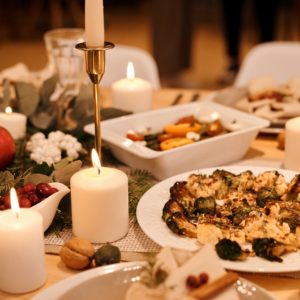Holiday Heartburn: 10 Tips for Preventing and Managing Acid Reflux and GERD

Celebrating the holidays often centers around food – so what do you do if you dread attending events because you don’t want acid reflux to rear its head? Take these steps to prevent and relieve heartburn, acid reflux, and GERD during the holidays (and beyond):
1. Mindful Eating
In the midst of holiday feasts, it can be easy to overindulge. Opt for smaller, more frequent meals to prevent excess pressure on the lower esophageal sphincter (LES), reducing the likelihood of stomach contents making their way back into the esophagus and causing you pain.
2. Choose Wisely
Avoid triggers such as spicy, acidic, and fatty foods (and the ultra-processed foods that affect your gut) that can exacerbate acid reflux symptoms. Choose lean proteins, whole grains, and plenty of fruits and vegetables.
3. Stay Hydrated, BUT Skip Carbonation
Water is your ally in the battle against acid reflux – but steer clear of carbonated beverages, since they can contribute to increased pressure in the stomach, potentially leading to reflux.
4. Time Your Meals
Allow ample time between your last meal and bedtime. Aim for at least two to three hours to give your stomach a chance to empty before lying down, reducing the risk of nighttime reflux.
5. Elevate Your Sleep
Adjust the angle of your sleeping surface by elevating the head of your bed or using a wedge pillow. This slight incline helps gravity keep stomach contents where they belong, easing the likelihood of reflux during the night.
6. Manage Stress
Practice stress-reducing techniques such as deep breathing, meditation, or a gentle stroll when holiday stress start creeping in. Stress management contributes not only to your mental well-being but also to your digestive health.
7. Watch the Waistline
Excess weight, especially around the abdominal area, can put additional pressure on the stomach and contribute to acid reflux. Maintain a healthy weight through a balanced diet and regular exercise to help keep your gastrointestinal tract running smoothly.
8. Chew (Sugar-Free) Gum
Chewing gum stimulates saliva production, which helps neutralize stomach acid. Choose sugar-free gum to avoid adding unnecessary calories.
9. Limit Alcohol Intake
Excessive alcohol consumption can relax the LES, increasing the likelihood of acid reflux. Moderation is key – and make sure you’re following the other steps mentioned if you’re wanting to consume alcohol.
10. Consult Your Gastroenterologist
If despite your efforts, acid reflux persists, give us a call at Gastrointestinal Specialists, P.C. in Troy, MI, to schedule an appointment with our team of knowledgeable gastrointestinal doctors. We’ll find out what’s causing your distress and tailor a treatment plan to get you on the path to feeling better.
